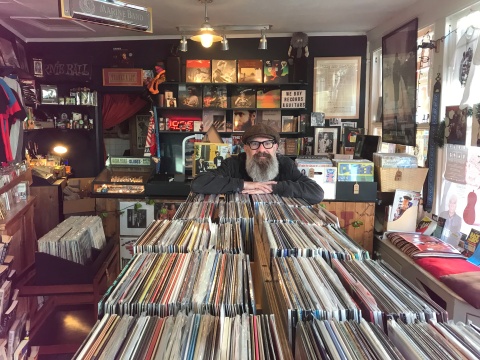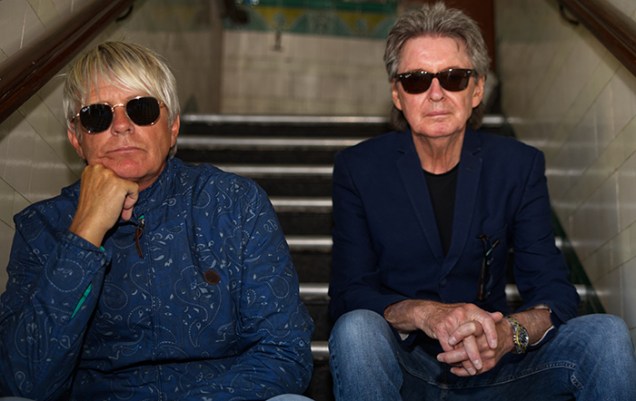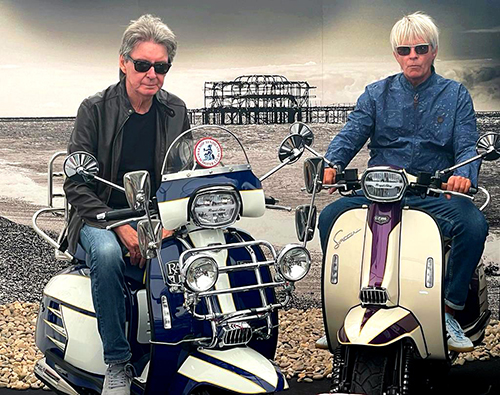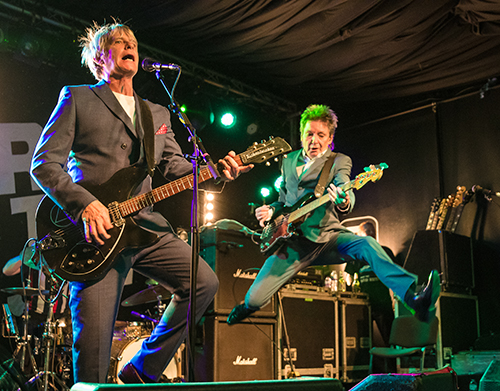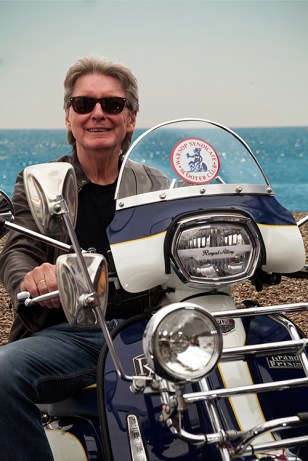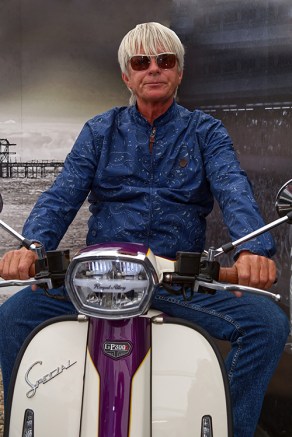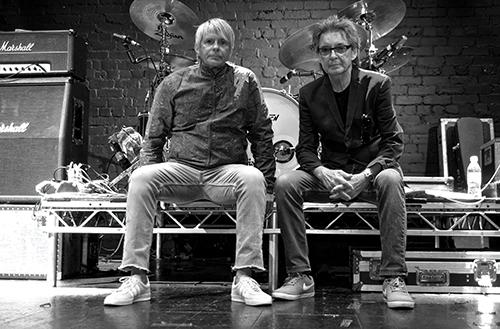
We talk to Say It With Garage Flowers favourite, Nev Cottee, about his new great album, Madrid, which, with its lush orchestration, cinematic atmosphere and groovy, psychedelic sounds, soaks up influences like ’60s Scott Walker, Ennio Morricone, Lee Hazlewood, Leonard Cohen and Serge Gainsbourg.
If that wasn’t enough, we also ask him if it’s true he’s relocating from Manchester to the Spanish city the record shares its name with, and get some top tips on where to get the best tapas, menú del día and olive oil.
Not only that, but he also kindly shares with us some cautionary advice on drinking wine in the afternoon…
It’s mid-October and Manchester-based singer-songwriter, Nev Cottee, is speaking to Say It With Garage Flowers from his allotment.
”It’s a glorious day – autumnal vibes,” he says. “It’s good to crack out the tweeds and the layers, isn’t it? A proper pair of shoes, socks… get the coat collection on the go after the summer – it’s a good time of year. Everything’s died off, so I’m just drinking a cup of tea and being English, in my allotment. Does it get any more English?”
Ironically though, we’re here to talk about all things Spanish – in particular, his superb new album, Madrid, but, rather fittingly, it does have some glorious autumnal vibes – largely thanks to its lush, Scott 4-like string arrangements and Cottee’s Lee Hazlewoodesque baritone croon.
‘It’s good to crack out the tweeds and the layers, isn’t it? A proper pair of shoes, socks… get the coat collection on the go after the summer’
More on that later, but before we get into the background on the record, we want to confirm if the rumours we’ve heard about him relocating from Manchester to Madrid are true…
“I’m trying, but Covid kind of got in the way – my girlfriend is in Madrid,” he explains. “The dream is to get over there. Madrid’s great, but I’m kind of over living in cities. I’m at that age where it’s too busy, there are too many people and it’s too noisy.
“I live in the centre of Manchester, but I’ve got a little sanctuary – my allotment. I don’t know how I’d balance that in Madrid.
“My girlfriend’s from Granada – a town called Jaén, which apparently has the best olive oil in Spain. That’s been confirmed by various Spanish people – there’s big competition there – but it’s supposed to be the best of the best. So, that’s where I want to go, and eat lots of food with lovely olive oil on it. Let’s see…. in the next couple of years…”
‘I’m kind of over living in cities. I’m at that age where it’s too busy, there are too many people and it’s too noisy’
Meanwhile, back to autumn 2022… Madrid, which is Cottee’s fifth album and out now on Wonderfulsound, could just be his best record yet.
Recorded at OO Studios in Spain and The Magic Lantern in Wales, it’s lush, dramatic and cinematic – first single, Renunciate, is haunted by the spectre of Leonard Cohen, Silver Screen and The Ring sound like long-lost Lee Hazlewood songs, Under The Skin is pure Scott 4, but with Bollywood strings, the instrumental title track is weird and groovy Serge Gainsbourg-style pysch-funk – think Histoire de Melody Nelson – whilst Johnny Ray is Ennio Morricone on horseback with Hazlewood, galloping off into the sunset, and A Million Years is upbeat orch-pop with a classic ’60s feel.
“This album kind of took care of itself. I had about three or four songs – the first single, Renunciate, and a few others, and I built on those themes to get a coherent album,” says Cottee. “I’m a bit of a one for trying to curate an album, so it’s a work that hangs together.”
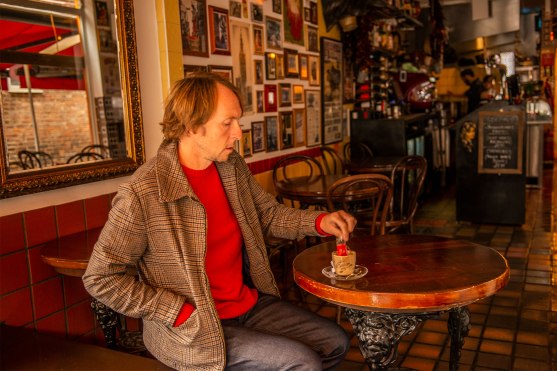
Q&A
When we last spoke, in 2020, for the vinyl release of your debut record, Stations, I asked you about your plans for the next album. You said you were working on a record with the working title of Solitary Singer and that you were listening to a lot of Scott Walker again.
You planned to go to Prague to record with an orchestra, to make a record that sounded like Scott 4, but you said that you’d also written another album – for a Lee Hazlewood alter ego.
You told me you wanted to write 10 songs that could stand up in the Hazlewood oeuvre. So, now you’ve got a new album out, Madrid, that sounds like Scott 4 and Hazlewood, as well as Leonard Cohen and Serge Gainsbourg, but it was recorded in OO Studios, in Spain, and The Magic Lantern, in Wales… How and why did the plans change?
Nev Cottee: I was hoping to get a live orchestra on it, but it was far too expensive – even in Prague. Someone said Prague is cheap, but it was still coming in at several thousand pounds, plus it was in Prague… It sounded interesting, but, in the end, I worked with the same producer, Mason Neely – we’ve done five albums now.
He scores all my songs – he’s classically-trained. He knows what he’s doing – unlike me. I provide melodies and hints and ideas. I send him stuff that’s on my phone – I hum along what I think the strings should do, and then he adapts it into actual real music.
He’s got a team of musicians – he did a couple of days down in Wales, at Magic Lantern, in Wales. He had a cellist and a viola player, and we got cracking with the strings.
There’s a definite Scott 4 feel to some of the songs…
NC: There are elements of Scott 4 – that’s always going to be the case with my albums (laughs).
I gave Mason references. For the song, Under The Skin, I wanted a repetitive string loop – real strings, but as if they were done on a machine. I was referencing The Flaming Lips and Scott 4 to get that weird, repetitive psych thing going on.
There’s a song called Angels of Ashes on Scott 4, which is phenomenal – it builds, but you don’t realise that you’re just listening to the same chord structure, again and again. It hits you about three minutes in – it’s amazing how he takes you on that journey. I started off with that in mind. I was attempting that, but it became something else.
The strings sound quite Bollywood…
NC: You’re right – it’s the repetition. We wanted a live take, but as if it was done on an edited repeat loop. It was an experiment. I wanted The Flaming Lips to do a remix of it. I did a bit of work with Nell Smith – she did an album of Nick Cave covers with them. She met Nick Cave and I think she’s going to do a song with him.
Under The Skin is a bit psych and a bit trippy. The lyrics go down that road – there’s a drug psychosis thing going on. A geezer who’s lost somewhere, losing his mind. Who knows?
Mason and I did some mad instrumentals too – we were just kicking some ideas around and jamming, with the idea of making some songs, but then decided they didn’t need vocals, as they were great instrumentals.
The instrumental title track is groovy, cinematic and psychedelic…
NC: Yeah – it’s straight out of the Serge Gainsbourg book. It’s very drum-heavy – Mason’s amazing on it. We said, ‘Don’t hold back on anything – if you can get a drum fill in anywhere, or a bass run, do it. Keep playing crazy stuff for as long as you can and see what comes out’. Nothing stays the same. There was going to be a vocal, but it was too mad to fit one on.
Did you have a definite idea of what you wanted this album to sound like?
NC: You’re always aiming for something, but then it just becomes its own thing. Once you’ve got two or three key tracks that defines the rest of the album – ‘Right, that’s got a single vibe, that’s a standout track, so let’s build all the others so it all fits together’…
My mate, Al, always tells me off when we’re in the pub, because he’s into albums that are really disparate and mad, like The White Album or 666 by Aphrodite’s Child – that’s his touchstone album. He says, ‘Just have loads of mad stuff and eventually it will sound good together’… I’m a bit of a one for trying to curate an album, so it’s a work that hangs together.
‘Mason Neely scores all my songs – he’s classically-trained. He knows what he’s doing – unlike me’
Maybe the ‘kitchen sink’ philosophy might be a good idea somewhere down the line – have some songs that have nothing in common and put them on an album… It would always have something in common because it would have my voice spread all over it – that’s the glue that ties it together.
This album kind of took care of itself. I had about three or four songs – the first single, Renunciate, and a few others, and I built on those themes to get a coherent album.
Have you renunciated anything recently?
NC: (laughs). No. I did a year of being a veggie but I like meat too much, and being in Spain, you’ve got not chance – you’re just going miss out on so much. If go out for menú del día [menu of the day], you get three courses and a bottle of red wine for about 10 euros. They introduced it to Madrid in the ’60s, for people who worked there but who didn’t have time to return home to make dinner.

The state, under Franco, implemented measures for certain cafés to sell menú del día. It’s good, cheap food – not amazing – but the standards are high in Spain because the produce is great.
The problem is that if you get a bottle of wine at one or two in the afternoon, you really do have to watch yourself… It’s dangerous out there! I don’t like drinking early, but, when you’re in Spain, there’s no other way. But then the Spanish stop, you see, but the English carry on…
‘Everyone wants to renunciate, but if you really want to do it, you’ve got to get to India, go halfway up the Himalayas, sit there in a loin cloth, do nothing and don’t eat – don’t even eat the snow’
The song, Renunciate, is very tongue-in-cheek. It’s about ideals. You always see these articles – on fitness and what to eat – the Sunday supplements are full of them. ‘Don’t eat that, do this, do that…’ The whole song’s an extreme version of all those ideas.
Everyone wants to renunciate, but if you really want to do it, you’ve got to get to India, go halfway up the Himalayas, sit there in a loin cloth, do nothing and don’t eat – don’t even eat the snow. They’re the renunciators – they’re the real deal.
We’re all sliding around at the other end of the scale: ‘I’m not going to smoke anymore – oh, I might have a cigarette’, or ‘I’m giving up drink for a month – oh, me mate’s going for a pint, sod it, I’ll go’….
I don’t think any of us have mastered the art of renunciation, if you want to do that, which I don’t think I do. When I was young, I had this idea that you would do that if you’d committed to being a yogi, but then you realise that life isn’t like that… Moderation is the key.
The song Johnny Ray sounds like it was influenced by Ennio Morricone…
NC: Yeah – that’s a song I’ve been playing live for quite a while. On some of Scott Walker’s albums, he has these beautiful ballads but he also throws in some songs in with that driving beat… I wanted to do that – it’s like Morricone too. Western and filmic. The lyrics are about an existential loner – that’s Johnny Ray, ‘God’s lonely man – a modern day Lone Ranger.’
‘God’s lonely man‘ is from Taxi Driver – Paul Schrader. Me and me mate always used to say it. It’s when you can’t get a girlfriend, you’re on your own and you’re drinking too much…
There are some Leonard Cohen influences on this record too…
I’m really into the late-period Leonard Cohen stuff – the three albums he did before he died. You Want It Darker is a masterpiece – absolutely wonderful. I was influenced by some of the instrumentation on that – a bit more stripped-down. It doesn’t have to be full-on drums and bass – you can use congas and percussive elements.
Two of my favourite songs on the album, Silver Screen and The Ring, both have a Hazlewood vibe…
NC: Hazlewood is always there. Silver Screen came out of a jam with Mason – heavy Serge bass. Those wacky and crazy songs he did – he used a lot of jazz musicians. Those pretty groovy drums and that deep, clicking bass.
I did my vocals with Martin Coogan. The song had a few lyrics – we sculpted this idea of a love of film and the silver screen. He said, ‘What you need to do is put some dialogue from a film on it’. At the time I was watching Albert Finney films – I went through his back catalogue and pretty much watched everything. I was on a Finney fest. Saturday Night and Sunday Morning is his pinnacle.
You get certain songs where they just arrive, fully-formed, in about two minutes. The Ring wrote itself – the words just tumbled out. It was the easiest thing in the world and was inspired by those duets Hazlewood did with Nancy Sinatra.
I did try to get a female vocalist on it – I asked Tess Parks, but she was dead busy and we couldn’t get into the studio. It was done remotely, but we just didn’t nail it. Maybe we’ll sort it for the next record.
‘I’m really into the late-period Leonard Cohen stuff – the three albums he did before he died. You Want It Darker is a masterpiece – absolutely wonderful’
So, what about that Lee Hazlewood alter ego album you wanted to make? What’s the plan for it?
NC: It’s demoed and it’s a thing in itself. It really does push the Lee Hazlewood button. I’m hoping to do some recording with Shawn Lee, but he’s just broken his leg, falling down the stairs – I saw that on Instagram. None of us are getting any younger.
When he’s better, I’m going to try and do the Hazlewood album with him. There are lots of duets on it. The Ring turned out really well for this album. I might have another go at it with a female singer.
‘I was speaking to the label about doing a Best Of. I want to call it Nevolution – the Best Of Nev Cottee’
There’s supposed to be a bit of a dialogue in the song, so that will probably end up on the Hazlewood album, but as a different entity. I really want to nail that Hazlewood sound, which is no mean feat.
 The way I see it, I’ve done five albums now – that’s the end of that phase. I was speaking to Miles [Copeland] at the label [Wonderfulsound] about doing a Best Of – I want to call it Nevolution – the Best Of Nev Cottee. That will put a full stop on that phase and then we’re away…
The way I see it, I’ve done five albums now – that’s the end of that phase. I was speaking to Miles [Copeland] at the label [Wonderfulsound] about doing a Best Of – I want to call it Nevolution – the Best Of Nev Cottee. That will put a full stop on that phase and then we’re away…
Me and Mason have done what we set out to do with the albums – I think they’ve got better and better as we’ve progressed. We’ve tried lots of different things – we’ve done everything – it’s time to move on and try a different producer.
‘I remember George Harrison saying that he’d never listened to Revolver. I was like, ‘Bollocks – you’ve listened to it!’ But he was there – he doesn’t need to listen to it, does he?’
I’m not going to use Mason on the Hazlewood album – I want to move in a different direction and try other things. The Hazlewood one’s amazing – I think the songs are really good, if I say so myself.
I love this album [Madrid], but you’re always excited about the next thing… I’m sure you’ve heard many musicians say that – you’ve written it, you’ve demoed it, then you’ve recorded it, mixed it, mastered it, listened to it… By the time it’s out, you’re onto the next thing and you’re excited by that. I always used to think musicians and bands were being stuck up… ‘Oh, no – we didn’t listen to the album…’ I kind of get it now, ‘cos they were there when it was recorded.
I remember George Harrison saying that he’d never listened to Revolver. I was like, ‘Bollocks – you’ve listened to it!’ But he was there – he doesn’t need to listen to it, does he?
When you listen back to an album, all you hear are the mistakes – what you should’ve done and different ideas…
On that note, how were the sessions for Madrid?
NC: It was the same drill – I’ve been working with Mason for a long time. I sent him the demos and he sent ideas back. I went down there for a few weeks, back and forth… Once you know each other it’s good – you’ve got that shorthand with how you work – it’s fast – and you’re not afraid of saying the wrong thing.
Let’s talk about some of the playing on the record…
NC: I play guitar on it – a bit of acoustic and electric – and I did some basic keyboard strings that Mason then turned into stuff, and also some bass. Mason’s a drum man and he does a lot of keys and samples. We used Rod Smith, who is an old friend of mine, on backing vocals. I was glad to get Caroline Sheehan on this album – she’s an amazing vocalist who’s based in Manchester. If you follow her on Instagram, [you’ll see] she’s the busiest woman in the world. Jimmy Hanley played mandolin and a bit of guitar. He’s in a great band from Manchester called Small Black Arrows.
I was trying to get Little Barrie on the album, but I couldn’t get hold of him. He’s big mates with Shawn Lee. I’d love him to do some nice guitar work on the Hazlewood stuff – some ’60s vibes. So, pencil that one in.
Any live shows planned?
NC: Early next year – hopefully a UK tour. Six or seven dates. The band are all really busy – they’re all young, dead energetic and in other bands. They’re doing too much. What’s wrong with them? They’ll realise soon enough…. I’m doing some album playbacks and I might do a few acoustic shows.
‘I was trying to get Little Barrie on the album, but I couldn’t get hold of him. I’d love him to do some nice guitar work on the next record – some ’60s vibes’
You’ve done Madrid. Where next? Can we expect any more geographically-themed albums? Are you going to travel around the globe, stopping off at cities for musical inspiration?
NC: [laughs]. I’ve love to do that. Imagine that – you just go to a country and call the album after wherever you are. That would be a good job. I’ve just been in Greece for three weeks. I was in Corfu and then I went island hopping. I did it years ago and it was a dream to go back. I went to Poros, Spetses and Hydra, which is where Leonard Cohen lived in the ’60s. I went to his house – I did a pilgrimage. It was amazing.

I’ve never been to Madrid. Any recommendations?
NC: It’s all about knowing which bars serve the best free tapas and the best menú del día. The areas you need to go to are La Latina, Lavapiés and Conde Duque, which is great. Start off in Conde Duque – there are loads of bars there and there’s always live music. You can’t really fail – just wander around. It’s trial and error. The Spanish have sussed the eating and drinking part of life out, as well as the sun positioning – they’ve got that down as well – but I’m not sure about the political side of things.
Madrid by Nev Cottee is out now on Wonderfulsound.
https://wonderfulsound.bandcamp.com/album/madrid
There are two album playback events in London and Manchester taking place this month: October 26 and 30, respectively.
